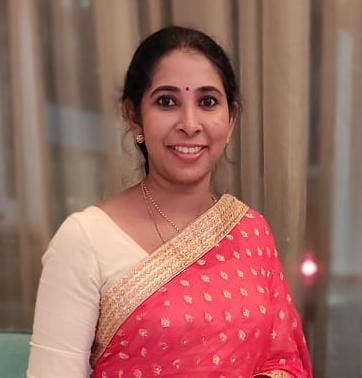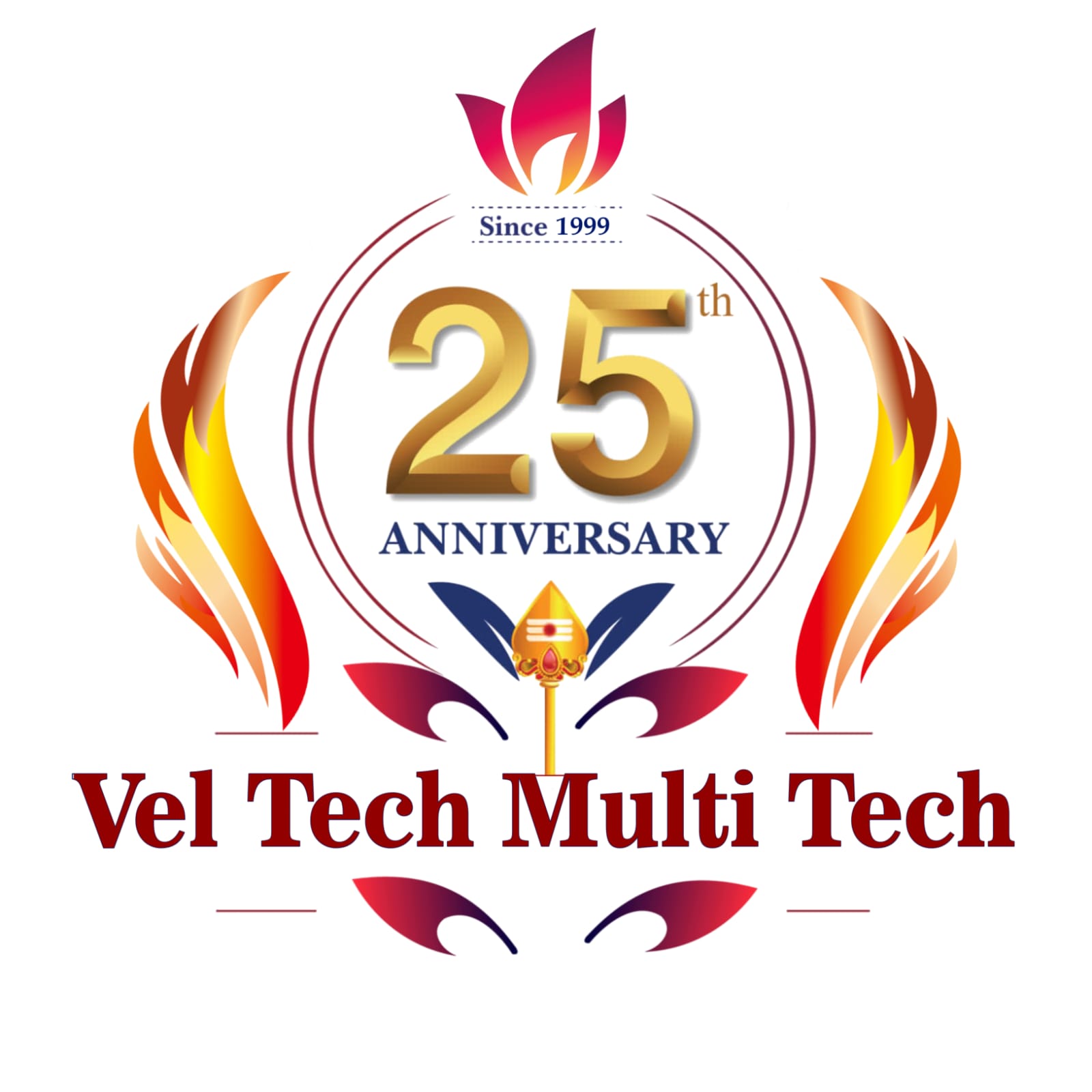ELECTRICAL AND ELECTRONICS ENGINEERING
ABOUT THE DEPARTMENT
The Department of Electrical and Electronics Engineering is an NBA accredited Department, and is one of the oldest Departments in Vel Tech MultiTech Dr.Rangarajan Dr.Sakunthala Engineering College and was established in the year 2001 with the approval of AICTE and with an initial sanctioned intake of 40 and presently it is increased to 60.Also the department is permanently affiliated to Anna University, Chennai. The department excels in quality education through advanced teaching methodology with adequate and well-equipped laboratories. The zealous and fervent faculty of the department shore up students professionally and personally to achieve their goals. Apart from making them good technocrats, we also provide individual attention to groom them as peerless citizens of our nation to serve the industry and society constructively.
VISION OF THE DEPARTMENT
To emerge as a centre of academic excellence in Electrical and Electronics Engineering and related fields through knowledge acquisition and propagation meeting global practices.
MISSION OF THE DEPARTMENT
To nurture the talent and to facilitate the students with research ambience in Electrical and Electronics Engineering.
To propagate lifelong learning.
To impart the right proportion of knowledge, attitudes and ethics in students to enable them take up positions of responsibility in the society and make significant contributions.
PROGRAMME EDUCATIONAL OBJECTIVES (PEO)
The objectives of a programme can be broadly defined on four counts. The programme educational objectives of engineering graduates of the Department of Electrical and Electronics are
| PEOs | PROGRAMME EDUCATIONAL OBJECTIVES |
|---|---|
| PEO1 | To prepare graduates to have successful and flourishing career in the electrical and electronics industry. |
| PEO2 | To make students able to excel in their career with ethical values and managerial skills to solve real life technical problems. |
| PEO3 | To make students capable of solving problems in electrical and electronics engineering which are found in utilities and industries. |
| PEO4 | To help students to engage in quest for self-learning and life-long learning. |
PROGRAMME OUTCOMES (POS)
| POs | PROGRAMME OUTCOMES |
|---|---|
| PO1 | Engineering knowledge: Enables to apply the knowledge of differential equations, integrals, matrix theory, Laplace, Fourier and z-transformation for engineering problems. |
| PO2 | Problem analysis: Enables to define Basic science, Circuit theory, Electromagnetic Field theory, Control theory and to apply them to analyze complex engineering problems. |
| PO3 | Design/development of solutions: Enables to configure and apply solutions to transmission and distribution networks, electrical apparatus and to handle the engineering aspects of Electrical Energy Generation and Utilization. |
| PO4 | Use research-based knowledge: Enable to analysis, synthesis and interpretate the data to provide valid conclusions. |
| PO5 | Modern tool usage: Enables to design, implement and evaluate computer-based system/tools to meet the desired needs. |
| PO6 | The engineer and society: Enables to apply the knowledge gained to assess societal, health, legal and cultural issues, and consequent responsibilities relevant to the professional engineering practice. |
| PO7 | Environment and sustainability: Enables to understand the impact of the Electrical Engineering solutions in societal and environmental contexts and demonstrates the knowledge of and need for sustainable development. |
| PO8 | Ethics: Apply ethical principles and commit to professional ethics and responsibilities and norms of the engineering practice. |
| PO9 | Individual and team work: Enables to function effectively on teams to full-fill the goals. |
| PO10 | Communication: Enables to express the dynamic solutions to fit-into the engineer community. |
| PO11 | Project management and finance: Demonstrate knowledge and understanding of engineering and management principles, and apply these to one’s own work, as a member or a leader in a team. |
| PO12 | Life-long learning: Enables to recognize the need for, and have the preparation to engage in continuing professional development. |
PROGRAMME SPECIFIC OUTCOMES (PSO)
| PSOs | PROGRAM SPECIFIC OUTCOMES |
|---|---|
| PSO1 | Be fundamentally strong in life sciences and to apply the knowledge of engineering sciences in solving mathematical and scientific problems related to healthcare. |
| PSO2 | Able to design a variety of electronic devices and software for applications including biomedical instrumentation, physiological measurement, rehabilitation engineering and medical imaging & informatics. (Design) |
| PSO3 | Able to meet desired needs within realistic constraints such as economic, environmental, social, ethical, health and safety, manufacturability and sustainability. (Society, Environmental, Sustainability) |
PROGRAM OFFERED:
B.E [Electrical and Electronics Engineering]
Intake: 60
EEE R-19: VTMT Syllabus (Applicable for batches admitted from 2019-2020)
M.E [Embedded Systems]
Intake: 12
EEE R-19: VTMT Syllabus (Applicable for batches admitted from 2019-2020)
HEAD OF THE DEPARTMENT

Dr.DEEPTHI JOSEPH
Professor & Head of the Department
-----
Dr. Deepthi Joseph is Professor & Head in the Department of Electrical and Electronics Engineering of Vel Tech Multi Tech Dr.Rangarajan Dr.Sakunthala Engineering College,Avadi,Chennai,Tamil Nadu, India.
She has received her B.Tech and M.Tech Degree From Mahatma Gandhi University and her Doctorate in Electrical Engineering from Anna University, Chennai.
She has thirteen years of teaching and research experience and her area of interest includes Power Quality, Power Electronics and Electrical Machines.
FACULTY PROFILE
| BOARD OF STUDIES MEMBERS | |||
|---|---|---|---|
| S.No | NAME | POSITION IN BOS | DESIGNATION |
| 1 | Dr.Deepthi Joseph | Chairman | Professor, Department of Electrical and Electronics Engg., Vel Tech Multi Tech Dr.Rangarajan Dr.Sakunthala Engg. College |
| 2 | Dr.P.K.Mani | Member | Associate Professor, Department of Electrical and Electronics Engg., Vel Tech Multi Tech Dr.Rangarajan Dr.Sakunthala Engg. College |
| 3 | Mr.S.Sivarajan | Member | Assistant Professor, Department of Electrical and Electronics Engg., Vel Tech Multi Tech Dr.Rangarajan Dr.Sakunthala Engg. College |
| 4 | Mr.K.Sakthidhasan | Member | Assistant Professor, Department of Electrical and Electronics Engg., Vel Tech Multi Tech Dr.Rangarajan Dr.Sakunthala Engg. College |
| 5 | Mr.N.Anantha Saravanan | Member | Assistant Professor, Department of Electrical and Electronics Engg., Vel Tech Multi Tech Dr.Rangarajan Dr.Sakunthala Engg. College |
| 6 | Mr.R.Jenin Prabhu | Member | Assistant Professor, Department of Electrical and Electronics Engg., Vel Tech Multi Tech Dr.Rangarajan Dr.Sakunthala Engg. College. |
| 7 | Mr.S.Dhananjeyan | Member | Assistant Professor, Department of Electrical and Electronics Engg., Vel Tech Multi Tech Dr.Rangarajan Dr.Sakunthala Engg. College |
| 8 | Mrs.P.Annapoorani | Member | Assistant Professor, Department of Electrical and Electronics Engg., Vel Tech Multi Tech Dr.Rangarajan Dr.Sakunthala Engg. College |
| 9 | Mrs.K.Rajalakshmi | Member | Assistant Professor, Department of Electrical and Electronics Engg., Vel Tech Multi Tech Dr.Rangarajan Dr.Sakunthala Engg. College |
| 10 | Mr.R.Balakrishnan | Member | Assistant Professor, Department of Electrical and Electronics Engg., Vel Tech Multi Tech Dr.Rangarajan Dr.Sakunthala Engg. College |
| 11 | Ms. P.Gajalaxmi | Member | Assistant Professor, Department of Electrical and Electronics Engg., Vel Tech Multi Tech Dr.Rangarajan Dr.Sakunthala Engg. College |
| 12 | Dr.N.Ananthan | Member | Assistant Professor, Department of Electrical and Electronics Engg., Vel Tech Multi Tech Dr.Rangarajan Dr.Sakunthala Engg. College |
| 13 | Ms.J.Nithya Jenev | Member | Assistant Professor, Department of Electrical and Electronics Engg., Vel Tech Multi Tech Dr.Rangarajan Dr.Sakunthala Engg. College |
| 14 | Dr.G. Saravana Ilango | Member (Subject Expert) | Associate Professor, Department of Electrical and Electronics Engg., College of Engg., National Institute of Technology, Tiruchirappalli |
| 15 | Dr.B.Chitti Babu | Member (Subject Expert) | Associate Professor, Department of Electrical and Electronics Engg., IITDM, Kancheepuram |
| 16 | Dr.R.Gnanadass | Member (University Nominee) | Professor, Department of Electrical and Electronics Engg., Pudhucherry Technological University,Pudhucherry |
| 17 | Mr. Aswin Pio Rayen | Member (Industry Expert) | LIEBHERR Container Cranes Ltd,IRELAND |
| 18 | Mr. S.Manikandan | Member (PG Meritorious Alumnus) | Lead Consultant, Virtusa Consulting service |
STAFF ROOMS
LABORATORIES
CLASS ROOMS
-
B.E – ELECTRICAL AND ELECTRONICS ENGINEERING S.NO REGISTER NO NAME OF THE STUDENT BATCH CGPA / PERCENTAGE UNIVERSITY RANK PHOTO 1 113114105028 JANANI.R 2014 – 2018 8.59 47 
2 113113105069 SUBHASHRI .B 2013 – 2017 8.88 27 
3 113113105024 JINU MARIAM JOLLY 2013 – 2017 8.7 44 
4 113113105013 CHARLES.T.A 2013 – 2017 8.68 46 
5 11810105040 KAVITHA.E 2010 – 2014 8.71 28 
6 11810105048 MEENAKUMARI.S 2010 – 2014 8.67 36 
7 11808105057 MONIKA SHARMA.L 2008 – 2012 9.1 10 
8 11808105092 SNEKALATHA. A K 2008 – 2012 8.94 23 
9 11808105112 VINITHA.K B 2008 – 2012 8.67 50 
M.E – EMBEDDED SYSTEM TECHNOLOGIES S.NO REGISTER NO NAME OF THE STUDENT BATCH CGPA / PERCENTAGE UNIVERSITY RANK PHOTO 1 113116431006 VINODHINI M 2016 – 2018 8.88 4 
2 113114431006 JAYANTHI. D 2014 – 2016 8.64 17 
3 113113431008 KAYALVIZHI. E 2013 – 2015 8.75 18 
4 113113431012 PRIYANKA. V 2013 – 2015 8.58 29 
5 113112431004 CHITHRA. K. S 2012 – 2014 9.04 4 
6 113112431017 VINUSHA MANI. M 2012 – 2014 9.00 5 
7 113112431003 BANU PRIYA. P 2012 – 2014 8.97 6 
8 11810431009 MANIKANDAN. E 2010 – 2012 8.88 2 
9 11810431014 SARANYA. M 2010 – 2012 8.68 5
| 2023 - 2024 | ||||
|---|---|---|---|---|
| S.No | DATE | YEAR | TOPIC | RESOURCE PERSON |
| 1 | 27.09.2023 | II & III | Battery Sizing for Solar PV system | Dr.Selvajyothi M.E.,Ph.D. Associate Professor, EEE, IIITDM, Kancheepuram. |
| 2 | 30.09.2023 | II, III & IV | Embedded Systems Design for Electrical Applications | Dr.S.Moorthi M.E.,Ph.D. Associate Professor, EEE Department, NIT,Trichy. |
| 2022 - 2023 | ||||
|---|---|---|---|---|
| S.No | DATE | YEAR | TOPIC | RESOURCE PERSON |
| 1 | 11.03.2023 | III | Power system planning studies | Dr.P.Somasundaram M.E.,Ph.D. Professor, Department of EEE. College of Engineering, Anna University. |
| 2 | 11.03.2023 | II | Control system and its applications in industries | Dr.P.Nirmal Kumar M.E.,Ph.D., Professor, Department of EEE, College of Engineering, Anna University. |
| 3 | 26.09.2022 | III & IV | Higher order machine learning models and their applications in Electrical Engineering | Dr.K.Udhaya Kumar M.E.,Ph.D., Professor,Department of EEE, Anna University, Chennai. |
| 4 | 28.11.2022 | II | Recent trends and application of DC machines in Industries | Dr.Ganeshkumar Srinivasan M.E.,Ph.D. Assistant Professor,Department of EEE, Anna University, Chennai. |
| 5 | 26.11.2022 | III | Recent Developments in Power Transmission systems and future planning | Dr.G.Balamurali M.E.,M.B.A.,Ph.D. Executive Engineer, Tamilnadu Transmission Corporation Limited, Chennai. |
| 2023 - 2024 | ||||
|---|---|---|---|---|
| S.No | DATE OF VISIT | YEAR | NAME OF THE INDUSTRY | ADDRESS |
| 1 | 16.08.2023 | III | PBL Maker space Teaching Learning Centre - IIITDM | Kancheepuram |
| 2 | 03.11.2023 | II | North Chennai Thermal Power Station - I | Chennai |
| 2022 - 2023 | ||||
|---|---|---|---|---|
| S.No | DATE OF VISIT | YEAR | NAME OF THE INDUSTRY | ADDRESS |
| 1 | 10.03.2023 | II | Sathanur Hydro Electric Power Station | Sathanur |
| 2 | 21.11.2022 | III | Sathanur Hydro Electric Power Station | Sathanur |
| 3 | 19.11.2022 | IV | Sathanur Hydro Electric Power Station | Sathanur |
| 4 | 26.09.2022 | II | Substation - 230/11kV, ETPS, Ennore | Chennai |
| S.NO | NAME OF THE FACULTY | DESIGNATION |
|---|---|---|
| 1 | Dr.DEEPTHI JOSEPH | Professor & Head |
| 2 | Dr.MANI.P.K | Associate Professor |
| 3 | Dr.ANANTHAN.N | Assistant Professor |
| 4 | Mr.SAKTHI DHASAN.K | Assistant Professor |
| 5 | Mr.DHANANJEYAN | Assistant Professor |
| 6 | Mr.SIVARAJAN | Assistant Professor |
| 7 | Ms.ANNAPOORANI.P | Assistant Professor |
| 8 | Mr.ANANTHA SARAVANAN.N | Assistant Professor |
| 9 | Mr.JENIN PRABHU.R | Assistant Professor |
| 10 | Ms.RAJALAKSHMI.K | Assistant Professor |
| 11 | Ms.NITHYA JENEV.J | Assistant Professor |
| 12 | Mr.BALAKRISHNAN.R | Assistant Professor |
| 13 | Ms.GAJALAXMI.P | Assistant Professor |
| 14 | Mr.KRISHNA KUMAR.S | Assistant Professor |


